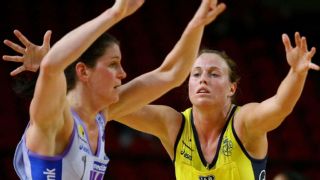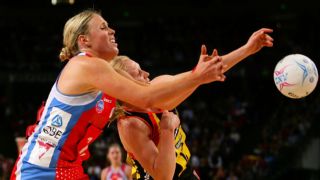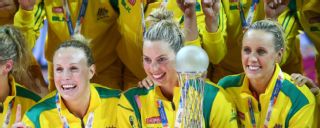|
Giants captain Kimberlee Green never wanted to play professional netball, never wanted to represent Australia, and never dreamed she'd be a role model for young players. Growing up, she dabbled, like many young kids, with several sports including netball, little athletics, even a failed attempt at swimming -- "unfortunately, and I hated every second of it". And she certainly had her sporting heroes - sprinter Melinda Gainsford-Taylor and basketballer Michele Timms -- but play professional sport? No, that never crossed her mind. "To be honest - no," Green told ESPN. "As a kid I looked up to athletes, for sure, but I never thought it was something I needed in my life. "I loved doing it, but I never wanted to play for Australia; I know a lot of young kids grow up saying 'yeah, I want to play for Australia' and that's really cool, but I was just never that kid. "When I was first picked up by the Swifts, I was baffled. I didn't even know who was in the team. I'd never watched it. I was hopeless. Not in my wildest dreams did I ever think I'd be doing this for a living for so long." Even with sports star parents -- her father, Ben Green, was a former South Sydney Rabbitohs footballer, and her mother, Denise Langford, was a swimmer who represented Australia at both Olympic and Commonwealth Games, winning four gold medals and a silver at Edinburgh 1970 -- Green never thought she'd follow her parents' footsteps into sporting life. "Mum and Dad were never pushy parents. Mum was an Olympic swimmer but there was only one year where she asked if I wanted to give swimming a crack. I said yes, unfortunately. I used to change her alarm clock so that she wouldn't wake up to wake me up because I hated getting up so early. "My parents were always very supportive of whatever I wanted to do, but they never pushed me into anything either." And if you're thinking, 'yeah, but she's got all those trophies and World Cup medals now', she wouldn't even be able to tell you where they are. "We don't keep medals. That's one thing in our family, you'll never see any trophies, medals, certificate, nothing; you'd never see them. "I think Mum has her Commonwealth Games medals hidden away in a box upstairs in the attic, and to be honest I wouldn't be able to tell you where my World Cup medal is. It's a great reward and achievement and in your hands it's nice to see, but for us the memories are so much bigger and better than that. "In our family trophies and medals weren't a big thing." For Green, becoming one of Australia's greatest netballers happened by chance. Shocked when she received the call, Green joined the then Sydney Swifts at 16-years-old and spent a year riding the bench before she even stepped foot on the court. Paid less than $Aus1000 a year, she never thought netball would become the game it has become, or that young girls would be screaming her name on the sideline. "Not at all," Green told ESPN of ever becoming a role model. "You often get lost in it as well. "I know after a game I really like to speak to the members and have a good chat to the young ones; it's just a really nice way to understand the reality of it all. How far we have come but also the fact we are role models to these young ones. Just a 'hello' and 'how's your day going' is so important. I guess on a scale it is massive for those young ones to see that they can connect with players like us. "Netball has done a really great job at giving the fans access to the players; there's not many sports where you get that opportunity. We've done a really great job in being able to create role models for these young ones coming through." More than a decade on from when she signed her first contract, Australian netball has phased through two competitions, the Commonwealth Bank Trophy and ANZ Championship, and now enters a new era of Super Netball. Super Netball will be televised on free-to-air TV, players will walk into contracts worth at least $Aus27,000 and be entitled to a ground-breaking parental care policy if they have young children. It's an amazing development for women's sport in Australia, a progression Green attributes to the work of former players. "Back in the Commonwealth Bank Trophy days, my first contract was worth $Aus500; so for where we are now, it's been really cool for me to be able to see the transition and understand all the hard work the former players like Liz Ellis, Sharelle McMahon and Cath Cox, all these people, all that effort they put in to build a really strong foundation for us; standing up for women's sport and making it clear we're here and we want to be a part of it.  "For me, my legacy is to pass it on to the young ones to understand how far we've come and not to take it for granted that you can walk into a minimum of $27k contract, and that's come a long way. Imagine back in the day if we'd had got that sort of money where we'd be today? "The more I can keep sharing those stories to the young ones, the more they understand. But also they can push a little bit more for the young ones coming through after them." It isn't just Green's work on the court that makes her a superstar; her work off the court as a welfare officer for the Giants AFL Women's team, to continue to improve women's sport, and women's ability to reach their goals, makes her such an influence on women's sport. "I originally started in welfare at Netball NSW, which was a role I created for someone but I ended up doing myself. I felt like there was quite the need for welfare in the netball space so I'd worked there for eight months and then one of the general managers over at the Giants contacted me and asked if I'd like to do the women's AFL. So I'm doing that at the moment, which I absolutely love; the girls are great. "Realistically I look after all the girls' welfare. So any issues they might be having on the field or off the field, educating them with different workshops; that might be on nutrition, mental preparation, anything like that. "These girls have been plucked from park football straight into a semi-elite environment, whereas for [netballers] we've had a pathway and we've been building resilience along the way; the girls in the AFL space definitely need some work around those little bits of pieces on the side like nutrition, building strength and all those things. I look after pretty much the holistic side of football for them, and I love it." Green, now entering her 14th season in netball, is one of the most experienced players in the inaugural Super Netball competition; she was a huge signing for the newly formed Giants side and a mighty loss for the Swifts, whom she had represented for more than a decade. She says the decision to move was not easy to consider; the Swifts made the decision for her, however, when they did not offer their star player a contract. "From my understanding they knew that I might be going and decided not to offer me [a contract], which was a little disappointing in the fact that I wasn't holding [moving to the Giants] lightly. "I was trying to make the right decision for both me as a netballer but also the team as well. So I wasn't offered anything in the end, and it made my decision pretty clear and simple. I haven't looked back, which has been awesome."  Green holds no regrets following her move, not even the two consecutive ANZ Championship finals losses to Queensland Firebirds. But she was left disappointed by one issue. "I never got the chance to say good bye to the fans and the members that I had really got to know, and they were a part of my family as well." Now back under the tutelage of her first professional coach, Julie Fitzgerald, Green has almost come full circle. Indeed, it was the lure of returning to the former Swifts coach that had he contemplating the Giants offer. "It was [a big decision]. I have so much respect for Julie Fitzgerald. As a 16-year-old growing up, she gave me the first opportunity to play for the Swifts. She'd been with us for so long and she ended up moving to New Zealand and was quite successful over there as well. I was always keeping a close eye on her and what she was doing, and any opportunity to play underneath her again was definitely a priority for me. "I knew with this new competition that it might be able to bring her home. When I got the phone call from her to see if I would be interested in popping over to the Giants and underneath her, it wasn't a decision I held lightly, that's for sure; but it was definitely something that I knew was a pulling point for me to get back underneath Jules. "Like I've said I've got so much respect for her, and I think she does such a great job bringing out the best in her players, I know I've played really great netball underneath her. She started my career and hopefully I'll be ending my career underneath her. It's a nice little story, too." Taking the helm as captain for a completely new side, Green won't be daunted by the prospect of leading a new group of young and old stars. And she is certain the team will succeed. "We're looking pretty good. I'm not going to say we're going to get the championship, but we're looking good and under the leadership of Julie Fitzgerald anything can happen."
|

